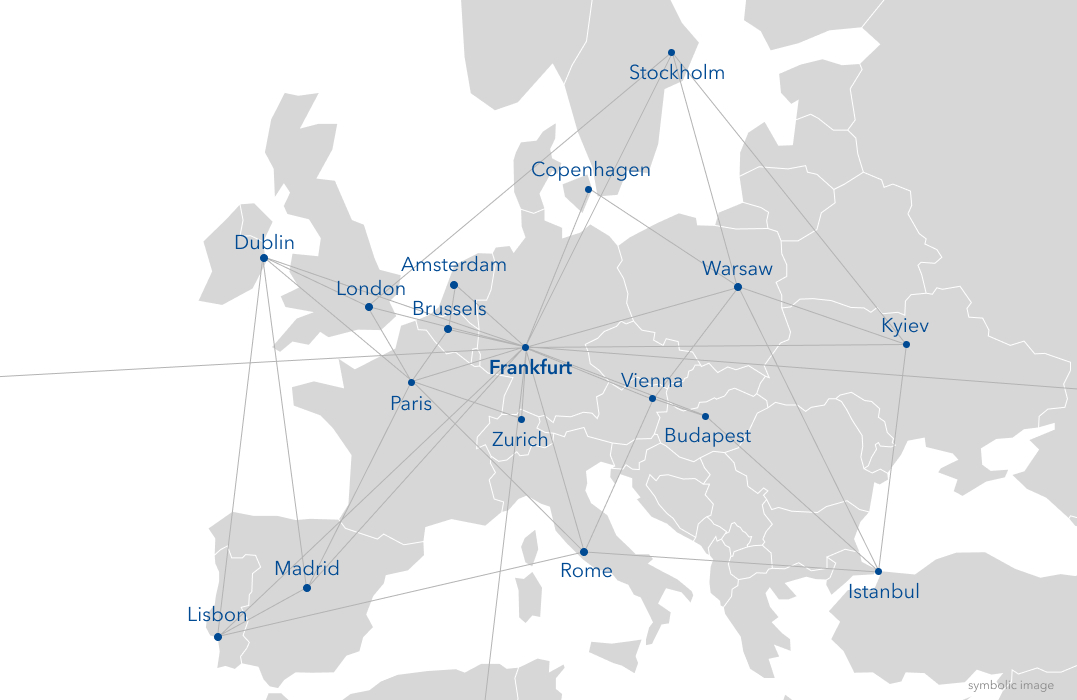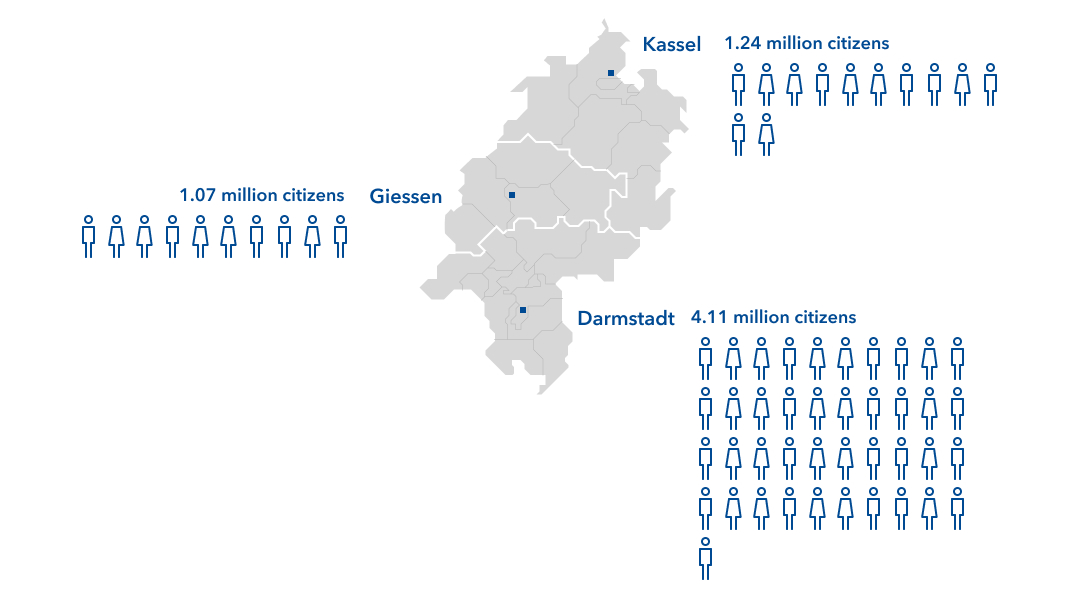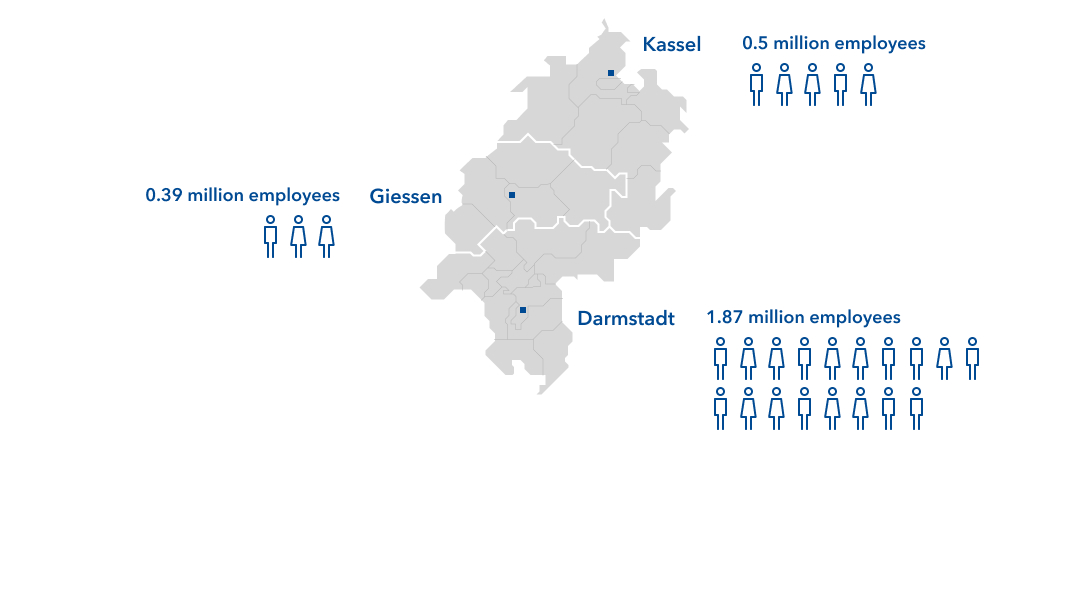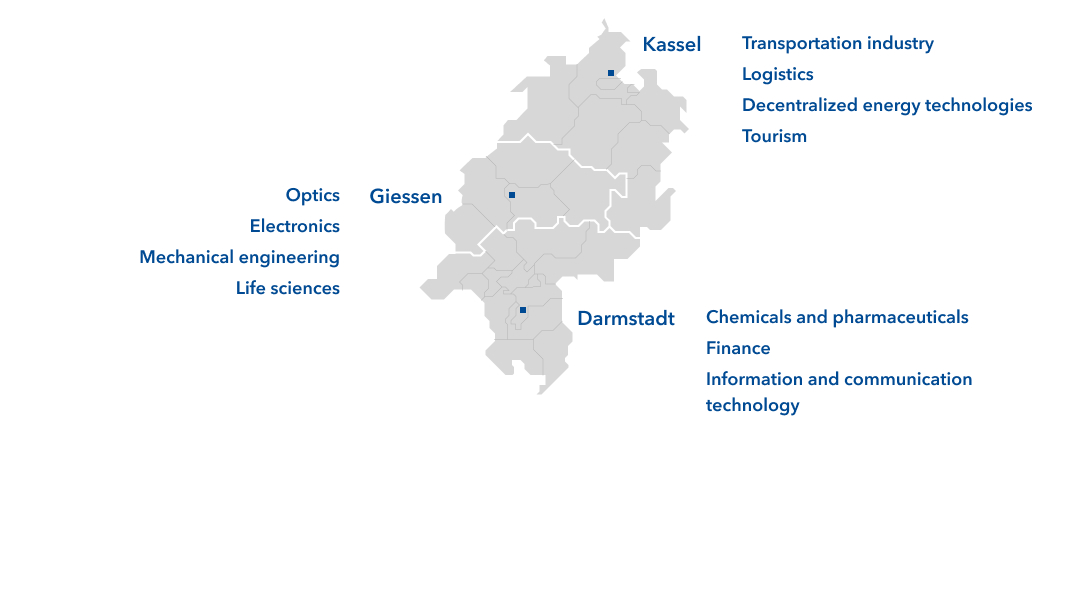A number is worth a thousand words

That's why I'll keep it short and let the numbers speak for themselves.
On this page you can discover data on Hessen's infrastructure, economy and labor market in exciting graphics.
Did you know that DE-CIX Frankfurt, with a data throughput of 17 Terabits per second, is one of the largest Internet exchanges in the world? And that there are 40 cluster and network initiatives with almost 3,500 members in Hessen?
No? Then let yourself be surprised by interesting and impressive facts about our state.
Have fun!
| In 2023 | Aircraft movements (in thousands) | Cargo (total traffic in 1,000 of metric tons) | Passengers (total traffic in millions) |
|---|---|---|---|
| Frankfurt (FRA) | 419 | 1,93 | 59.4 |
| Paris (CDG) | 448 | 1,815 | 67.4 |
| Amsterdam (AMS) | 441 | 1,378 | 61.9 |
| London (LHR) | 454 | 1,437 | 79.2 |

With peak traffic of more than 17 Tbit/s, DE-CIX Frankfurt is one of the world's leading Internet exchanges.
Frankfurt is gigabyte city (over 90% of Frankfurt's households can surf the Internet at speeds of at least 1 gigabyte/second).
Hessen is one of the top German states for optical fibre expansion.


Move your cursor over the diagram to see further information
| Economic sectors | Employees total | Employees in % | |
|---|---|---|---|
| Manufacturing industry | 433,531 | 15.8 | |
| Trade; vehicle maintenance, and repair | 354,291 | 12.9 | |
| Real estate, freelance, scientific and technical services | 272,699 | 10.0 | |
| Transportation and warehousing | 198,636 | 7.3 | |
| Healthcare | 187,072 | 6.8 | |
| Residential facilities and social services | 178,899 | 6.5 | |
| Public administration, defense, social security, ext. organization | 163,508 | 6.0 | |
| Other economical services | 147,269 | 5.4 | |
| Financial and insurance services | 148,234 | 5.4 | |
| Construction | 144,181 | 5.3 | |
| Information and communication | 121,688 | 4.4 | |
| Education and teaching | 109,111 | 3.9 | |
| Other services, private households | 87,883 | 3.2 | |
| Hospitality industry | 83,747 | 3.1 | |
| Employee leasing | 51,581 | 1.9 | |
| Mining, energy and water supply, waste disposal industry | 43,148 | 1.6 | |
| Agriculture, forestry and fisheries | 10,016 | 0.4 |
Vocational training is crucial to Hessenʼs innovative strength and competitiveness, and an essential part of the dual training system. Vocational training supplies companies with qualified, practically trained specialists who can contribute to their companies’ value chains as soon as they have passed their final examinations. Dual vocational training gives trainees advanced occupational qualifications or access to higher education without a school leaving certificate. Companies value these skilled workers highly.
In addition to standard university programs, young people can get ahead through dual study programs, which combine practical on-the-job training with academic teaching in a more practically oriented course of study. More and more companies, universities, and young people are recognizing the advantages of dual study programs: 153 courses at 18 universities, universities of applied sciences, and universities of cooperative education speak for themselves.
Hessen’s businesses exported goods worth EUR 80.34 billion in 2023, while imports totaled EUR 122.2 billion.
Chemical and pharmaceutical products are Hessen’s biggest export success story. They again come top of the list in 2023, accounting for almost EUR 23.5 billion or 29.2% of Hessen's exports. They are followed by machinery and vehicles, vehicle parts and accessories. These product groups, along with electrical engineering products, are also some of the state’s most important imports. Chemical and pharmaceutical products ranked here at EUR 21.1 billion, followed by electrical engineering products at EUR 18.3 billion.
Move your cursor over the diagram to see further information
| Product groups | Exports in 2023 in EUR Million | Exports in 2023 in % | |
|---|---|---|---|
| Chemical and pharmaceutical products | 23,421 | 29.2 | |
| Machinery | 9,392 | 11.7 | |
| Vehicles, vehicle parts and accessoires | 7,845 | 9.8 | |
| Intermediate products | 7,388 | 9.2 | |
| Electrical engineering products | 7,279 | 9.1 | |
| Food industry | 4,317 | 5.4 | |
| Other goods | 1,681 | 2.1 | |
| Raw materials | 0,430 | 0.5 | |
| Other finished goods | 28,94 | 36.0 |
Move your cursor over the diagram to see further information
| Product groups | Imports in 2023 in EUR Million | Imports in 2023 in % | |
|---|---|---|---|
| Chemical and pharmaceutical products | 21,119 | 17.3 | |
| Electrical engineering products | 18,306 | 14.9 | |
| Vehicles, vehicle parts and accessoires | 15,832 | 12.9 | |
| Machinery | 11,491 | 9.4 | |
| Intermediate products | 10,385 | 8.5 | |
| Food industry | 6,751 | 5.5 | |
| Other goods | 5,607 | 4.6 | |
| Raw materials | 4,808 | 3.9 | |
| Other finished goods | 27,852 | 22.8 |
Move your cursor over the map to see trading partners
Exports to selected countries in 2023
| Country | Value in EUR million |
|---|---|
| USA | 9,897 |
| France | 6,211 |
| United Kindom | 5,118 |
| Poland | 4,779 |
| Netherlands | 4,371 |
| China | 3,957 |
| Spain | 3,519 |
| Austria | 3,468 |
| Czech Republic | 3,262 |
| Other countries | 35,757 |
| Total | 80,339 |
Imports from selected countries in 2023
| Country | Hessen in EUR million |
|---|---|
| USA | 14,633 |
| China | 12,572 |
| France | 10,098 |
| Netherlands | 7,600 |
| Switzerland | 6,390 |
| Belgium | 6,230 |
| Italy | 5,489 |
| Czech Republic | 4,312 |
| United Kindom | 4,309 |
| Other countries | 50,519 |
| Total | 122,151 |
